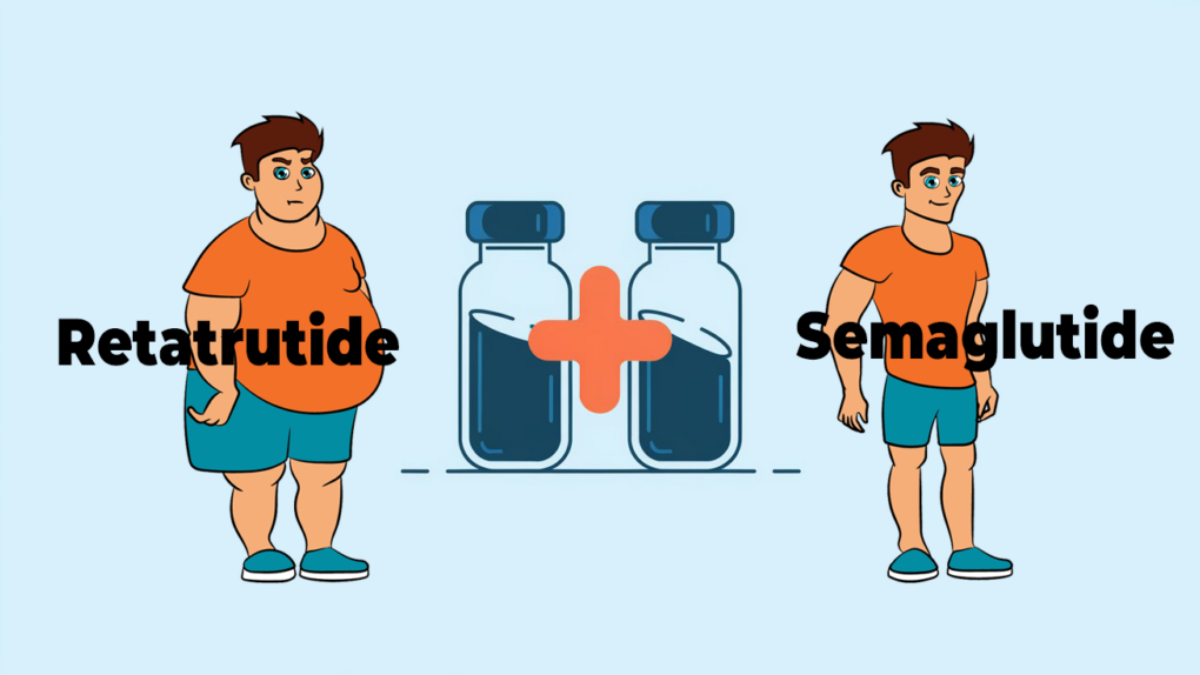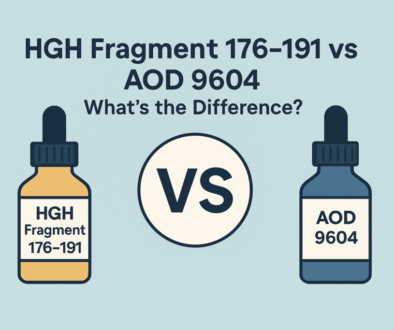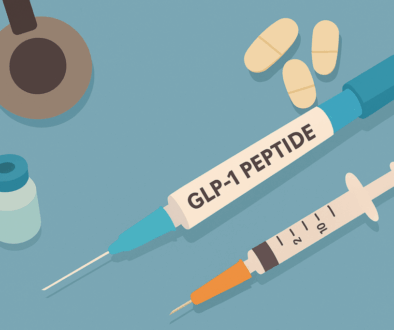Taking Retatrutide and Semaglutide Together For Weight Loss: Research Insights

Retatrutide and semaglutide are two popular weight-loss GLP-1 peptides. Both are backed by multiple clinical studies showing significant weight loss, but unfortunately, there aren’t any studies of a combined treatment.
Having said that, here’s all the useful info we can gleam the research evidence on the effects and safety of combining semaglutide and retatrutide.
Quick Summary:
- Researchers have not yet looked at combining semaglutide with retatrutide for weight loss
- Combining the peptides may amplify common side effects (nausea, vomiting, diarrhea), and the cardiovascular impact is uncertain due to the lack of clinical studies on their combined use
- Retatrutide alone shows much greater weight loss than semaglutide, suggesting that combining them may not offer much benefit to outweigh the increased risks
Table of Contents
How They Work
Retatrutide and semaglutide are both used for weight loss and diabetes, but they work a bit differently:
- Semaglutide:
- Mimics a hormone called GLP-1, which helps control appetite.
- Makes you feel fuller longer by slowing down digestion.
- Helps the body release more insulin and lower blood sugar levels.
- Retatrutide:
- Works on three different hormones: GLP-1 (like semaglutide), GIP, and glucagon.
- Reduces appetite like semaglutide.
- GIP helps the body release even more insulin and manage fat.
- Glucagon increases fat burning by boosting your metabolism.
We can see that while semaglutide and retatrutide overlap with their GLP-1 effects, the latter also works on other receptors, which explains why it’s generally more effective for weight loss.
Why Combining Retatrutide and Semaglutide Can Be Risky
The main concern with stacking retatrutide and semaglutide is the increased risk of side effects. Since they both impact the GLP-1 pathway, that means the side effects can become more intense.
Both retatrutide and semaglutide are known to cause nausea, vomiting, diarrhea, and other digestive issues, as they slow down gastric emptying and influence the body’s metabolism. Taking them together could amplify these side effects, making them difficult to tolerate.
GLP-1 agonists are also known to impact blood pressure, heart rate, and cardiovascular health, so adding extra strain on these systems might increase the risk of complications.
Most importantly, the combination of retatrutide and semaglutide hasn’t been studied, so we don’t know how serious the side effects could be. So far, studies have only looked at the effects of these GLP-1 peptides separately.
Join Our Newsletter — Get 15% Off
Get the latest offers, peptide research insights, and stock updates.
Retatrutide is Much More Effective
Another fact to point out is that retatrutide is significantly more effective than semaglutide for weight loss. For example:
- A 48-week study of high-dose (12 mg) retatrutide reported -24.2% average weight loss in overweight and obese adults.
- Meanwhile, a 52-week (1-year) study of semaglutide (taken at the highest tolerable dose for each person) reported only -7.9% average weight loss.
In that sense, the risk of side effects may not be worth the slightly greater weight loss an individual might experience by combining retatrutide with semaglutide. Retatrutide’s triple-action effect already offers a comprehensive approach to weight loss by targeting multiple pathways.
Combining Retatrutide with Semaglutide: Dosages
There’s no official dosage for combining retatrutide with semaglutide because there aren’t any studies on this combination treatment. However, we know that:
- Semaglutide is typically started at 0.25 mg and raised to a standard dose of 2.4 mg once a week
- Retatrutide is typically started at 2 mg and raised to a maximum dose of 12 mg once a week
-
- Filippatos, Theodosios D., Thalia V. Panagiotopoulou, and Moses S. Elisaf. “Adverse effects of GLP-1 receptor agonists.” The review of diabetic studies: RDS 11.3 (2014): 202.
- Rodriguez, Patricia J., et al. “Comparative Effectiveness of Semaglutide and Tirzepatide for Weight Loss in Adults with Overweight and Obesity in the US: A Real-World Evidence Study.” medRxiv (2023): 2023-11.
- Jastreboff, Ania M., et al. “Triple–hormone-receptor agonist retatrutide for obesity—a phase 2 trial.” New England Journal of Medicine 389.6 (2023): 514-526.



